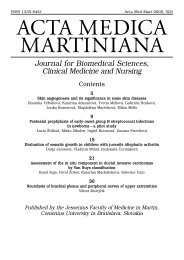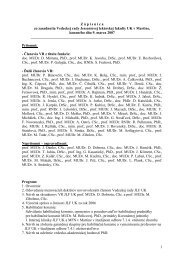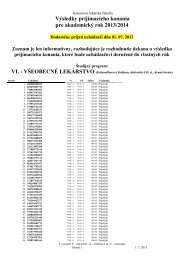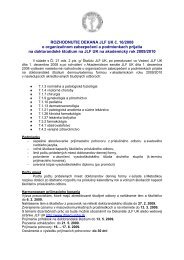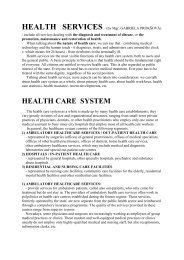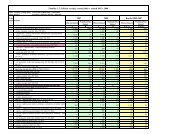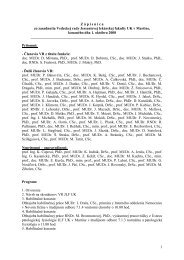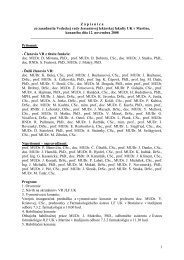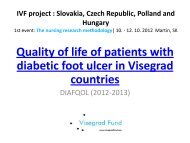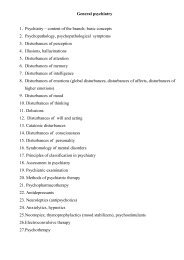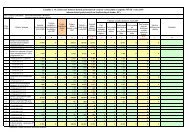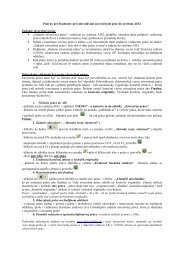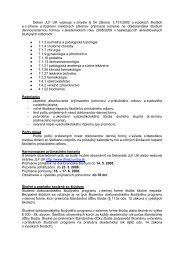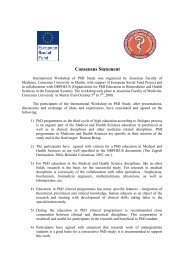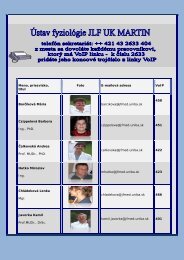You also want an ePaper? Increase the reach of your titles
YUMPU automatically turns print PDFs into web optimized ePapers that Google loves.
<strong>MAKETA</strong> 7-2 <strong>po</strong> 8.1.2008 7:10 Str. 9<br />
A C T A M E D I C A M A R T I N I A N A 2 0 0 7 7/2 9<br />
TUMOUR SUPPRESSIVE EFFECT OF LETROZOLE IN MAMMARY<br />
CARCINOGENESIS OF FEMALE RATS<br />
VLADIMÍRA SADLOŇOVÁ 1 , PETER KUBATKA 1 , IVETA ŠVECOVÁ 1 , KAROL KAJO 2 ,<br />
GABRIELA NOSÁĽOVÁ 1 , JURINA SADLOŇOVÁ 3<br />
1<br />
Department of Pharmacology, Comenius University, Jessenius Faculty of Medicine, Martin,<br />
2<br />
Department of Pathology, Comenius University, Jessenius Faculty of Medicine, Martin, 3 Clinic of Internal Medicine I,<br />
Comenius University, Jessenius Faculty of Medicine, Martin, Slovakia<br />
A b s t r a c t<br />
The aim of this study was to make experimental premenopausal model of the mammary carcinogenesis that would<br />
enable to assess preventive tumour suppressive effect of aromatase inhibitor letrozole. We also evaluated side-effects or<br />
adverse effects of letrozole on an organism. This model mimicked situation in healthy, but from the <strong>po</strong>int of view of the<br />
development of breast cancer, high-risk premenopausal women.<br />
Female Sprague-Dawley rats used in the experiment were divided into 3 groups. Aromatase inhibitor letrozole was<br />
used as a chemopreventive agent taken by the animals in the food during the whole period of time of the experiment.<br />
Group 1 - the control group had taken food without letrozole, the groups 2 and 3 with letrozole in various concentrations.<br />
To induce mammary carcinogenesis carcinogen N-methyl-N-nitrosourea (NMU) was used.<br />
In the control letrozole-free group 75 per cent - incidence of mammary tumour was observed. In the group 2 with<br />
letrozole administered in the concentration of 1 mg per 1 kg of food the incidence of mammary tumours was 5.2 per cent.<br />
In the group 3 with letrozole concentration of 10 mg per 1 kg of food total suppression of the mammary carcinogenesis<br />
was observed.<br />
Our experiment showed apparent preventive tumour suppressive effect of letrozole in the premenopausal model of<br />
mammary carcinogenesis in the female Sprague-Dawley rats.<br />
Key words: mammary carcinogenesis, chemoprevention, aromatase inhibitors, letrozole, female rats<br />
INTRODUCTION<br />
Till recently, the most frequently used agent in the hormonal treatment of all stages of breast<br />
cancer in the women with receptor-dependent tumours was the selective estrogen receptor modulator<br />
tamoxifen, regardless of their age and menopausal condition (1). In spite of its efficacy,<br />
tamoxifen treatment was associated with many serious adverse effects. This was the reason to<br />
search for new therapeutic alternatives with similar or even higher efficacy and lower toxicity.<br />
In <strong>po</strong>stmenopausal women, production of estrogens in ovaries is suppressed. Peripheral tissues,<br />
e.g. fat tissue, muscles, liver or breast, are becoming main sources of estrogen synthesis.<br />
Due to the effects of aromatase enzyme, it catalyzes conversion of androgens, androstenedione<br />
and testosterone into estrogens, estrone and estradiol. This knowledge led to the development of<br />
agents denoted as aromatase inhibitors, which block the process of estrogen production sup<strong>po</strong>rting<br />
the growth of hormone-dependent breast tumours (2). At present, new aromatase<br />
inhibitors - anastrozole, letrozole and exemestane are approved and used in clinical practice.<br />
There is evidence, that new non-steroidal aromatase inhibitor letrozole, a derivate of benzyltriazole,<br />
is superior to tamoxifen in the first-line therapy for advanced breast cancer in <strong>po</strong>stmenopausal<br />
women (3) and also in adjuvant therapy of <strong>po</strong>stmenopausal women with breast cancer<br />
(4, 5). It was assumed that aromatase inhibitors might be more effective than tamoxifen also<br />
in neoadjuvant therapy (6). Based on the results of the above cited studies, letrozole was<br />
approved as the drug for the first-line therapy of <strong>po</strong>stmenopausal women with advanced receptor-<strong>po</strong>sitive<br />
breast cancer, also in adjuvant and neoadjuvant therapy of <strong>po</strong>stmenopausal women<br />
with a receptor-<strong>po</strong>sitive early-stage breast cancer.<br />
Address for corres<strong>po</strong>ndence:<br />
Vladimíra Sadloňová, MD., Department of Pharmacology, Comenius University, Jessenius Faculty of Medicine, Sklabinská<br />
26, SK-037 53 Martin, Slovakia<br />
Phone: +421 43 4132535, e-mail: vsadlonova@jfmed.uniba.sk



